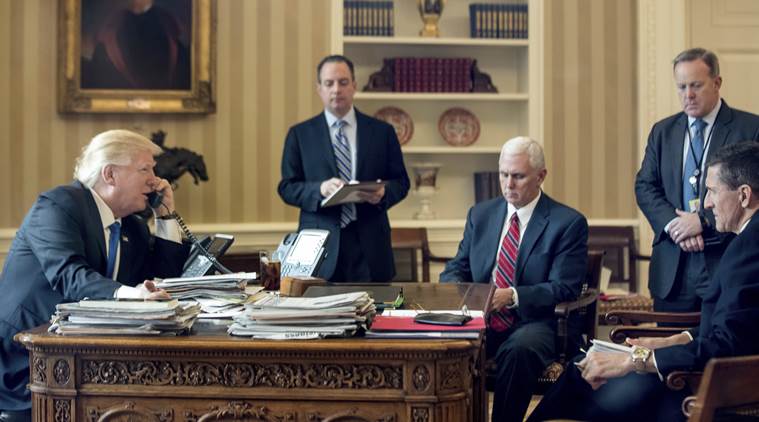
President Donald Trump, accompanied by Chief of Staff Reince Priebus, Vice President Mike Pence, White House press secretary Sean Spicer and National Security Adviser Michael Flynn, speaks on the phone with with Russian President Vladimir Putin, Saturday, Jan. 28, 2017. (AP Photo/Andrew Harnik)
Similar to the two prior U.S. Presidential administrations, the current administration is making overtures towards Russia in the hope of improving U.S.-Russian relations. However, any penchant for deal-making must be buttressed by the clear understanding of other great powers’ legitimate security interests. Additionally, the realization by the U.S. national security establishment that other great powers’ national security architectures consider their own interests no less important to them than the U.S. does its own is critical.
President Trump has recently signaled his new policy orientation towards both China and Russia in two unorthodox moves. With respect to China, the administration has indicated that unless U.S.-China trade relations are better balanced in favor of the U.S., then the “One China” policy might be under review by the U.S.. Similarly, the administration has hinted at possible removal of U.S. sanctions against Russia in return for a new agreement on nuclear weapons.
While there are indeed some calls for the U.S. to review its “One China” policy, most of these have been voiced without consideration of the Chinese standpoint. Fundamentally, China has spent a generation gradually improving the economic benefits for its citizenry, resulting in more people being lifted out of poverty than ever before in human history. With the end of the Cold War, this economic development has been the basis for the continued legitimacy of China’s leadership in the eyes of its people.
Why, then, would it proceed to jeopardize this legitimacy for the the sake of a trade deal more favorable to the U.S.? As China has itself voiced multiple times, domestic considerations will override global perceptions of itself if given a choice between the two. Lastly, governmental legitimacy is surely a (if not the) prime example of this stark choice.
This pattern of attempting to leverage resolution over immediate issues into questions concerning other states’ overriding national security objectives continues with Russia. As stated above, the U.S. has indicated that it may be amenable to removal of Russian sanctions if a deal can be reached on nuclear armaments between the two sides. However, this deal will be next to impossible to reach, much less actually implement because of two key factors.
First, Russia’s nuclear superiority to the U.S. is a key plank in its bid to re-establish itself as a great power. What sane great power would make any deal towards nuclear weapons reductions when faced with conventional forces massing on its borders in the form of NATO? Additionally, any true progress towards any kinds of mutual arms reduction on both sides would require mutual trust. As is quite evident, there is absolutely zero strategic trust between the U.S. and Russia currently. Again, there is a tendency here by the U.S. to overestimate the importance of issues such as trade (increased or decreased) to a particular country when that country’s own core security interests are at stake.
Secondly, and more importantly, U.S. sanctions were initially imposed on Russia because of the Ukraine Crisis, not any nuclear issues. Again, the Ukraine Crisis is but a symptom of much larger issues between the U.S. and Russia going back to the end of the Cold War. There will be zero progress on issues such as Ukraine and Syria unless these underlying issues are addressed holistically.
Lastly, at the recent CSIS event, “Russia in Global Affairs”, the panel chair actually thanked the U.S. for the role of its sanctions in bringing Russia and China closer together. At the same event, yet another panelist made it quite clear that even if U.S.-Russian relations were improved, this would have absolutely no bearing on Sino-Russian relations. Again, this is evidence of the strategic mistrust between the U.S. and Russia.
In the end, perhaps the most immediate obstacle to the new U.S. administration’s outreach towards both China and Russia is the U.S.’ own national security architecture. Labeled “The Blob” by the previous administration, it is apparently composed of elements of the defense establishment and the intelligence community, as well as various think tanks and media outlets. The fear is that any intrinsic deal-making expertise brought to bear by the new administration will be ultimately countermanded by The Blob, which apparently is impervious to the desires of The White House, irrespective of any actual party affiliation.
Similar to the national interests of both China and Russia, The Blob is responsible for upholding the national security interests of the U.S.. These interests are many, but surely the paramount interest must be to retain hegemony in a liberal, rules-based order, while simultaneously preventing the rise of peer competitors in East Asia (China) and Eurasia (Russia). Unfortunately for the U.S., even some its staunchest allies have recently voiced a reluctance for further “nation-building”, where Western values are imposed on sovereign regional states. It’s far too early to tell how this game will play out, but what is clear is that unless the new administration understands and respects the national security interests of all three states, there will be no progress at all.